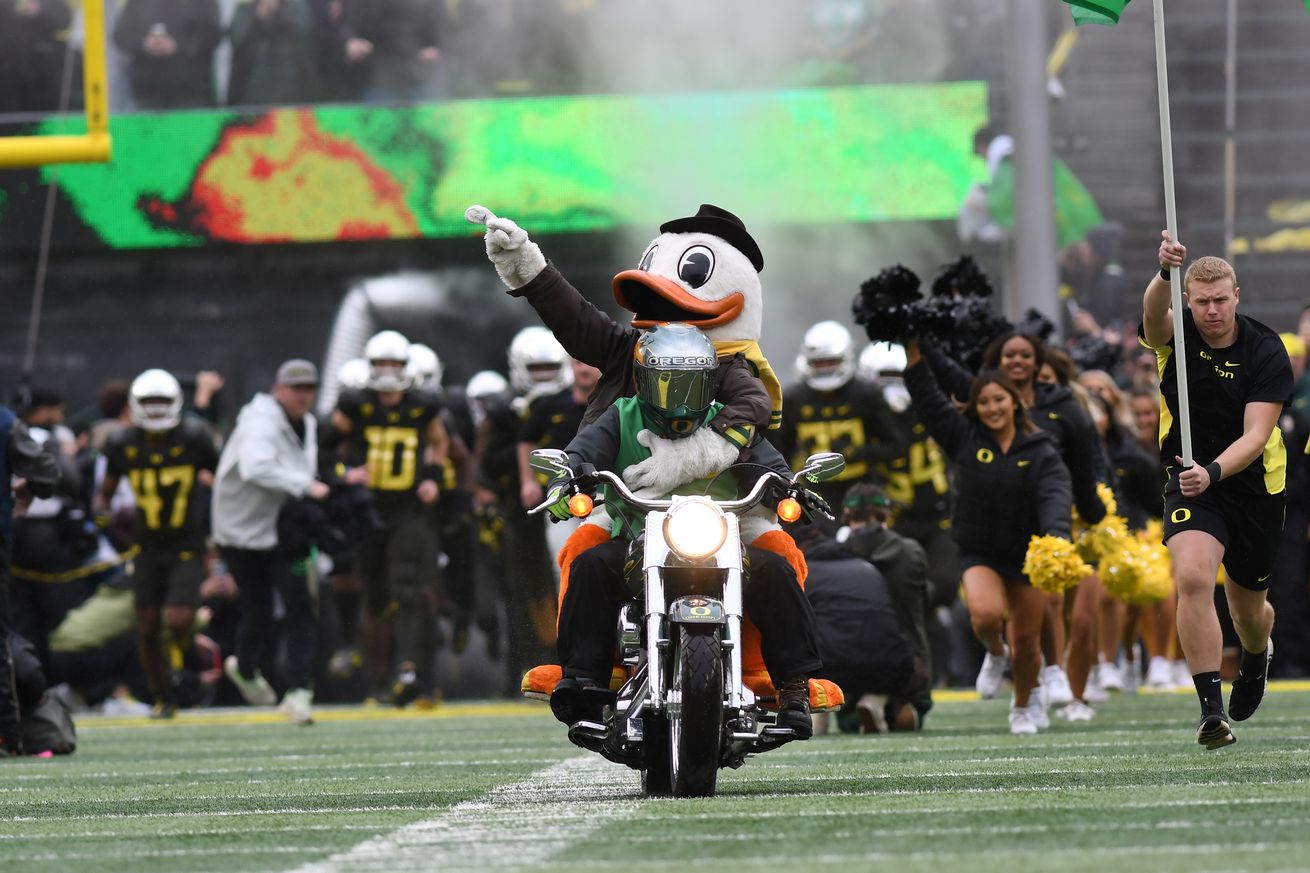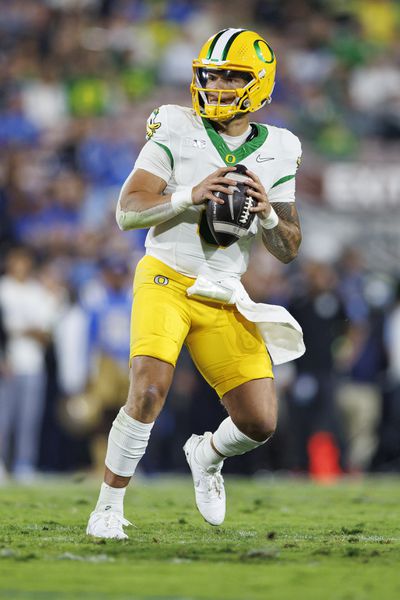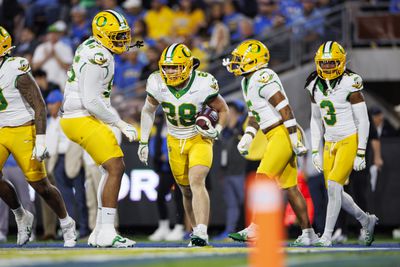
No letup in difficulty as the Spartans approach the midpoint of the schedule
After dropping their last two games, there is no let up for Michigan State as they travel to Autzen Stadium to take on the Oregon Ducks. Michigan State comes in at 3-2 overall and 1-1 in Big Ten play. The Spartans started 3-0 after escaping Florida Atlantic in the home opener, rebounding for a big win at Maryland, and doing as expected against FCS Prairie View A&M. Since the undefeated start, however, the Spartans let one slip away at Boston College and, despite some promise early in the game, went down to Ohio State in familiar fashion 38-7.
Oregon comes in ranked #6 at 4-0 and 1-0 in conference play. They opened the season with closer than expected wins at home against Idaho and Boise State. Since then, the Ducks have been flying higher, trouncing rival Oregon State in Corvallis 49-14 and winning their first ever Big Ten conference game at UCLA 34-13. The game against MSU will be Oregon’s first Big Ten conference home game.
Oregon’s only losses last year both came to Washington, losing by 3 points in Seattle and then coming up just 3 points short again to the Huskies in the Pac 12 championship game. Washington, of course, advanced to the national championship game, falling to a scandal-plagued program (*) we’re all familiar with.
If Oregon had prevailed in the final (as we know it) Pac 12 championship game, they likely would have made the 4 team playoff. After coming so close last year, and starting undefeated this year, the Ducks have to be considered the top challenger to Ohio State in the Big Ten. In fact, Oregon was my preseason pick to win the conference and advance to the national championship game (against Georgia – looks like that could be wrong) because I thought they might have the best quarterback in the league and get to play Ohio State at home – which happens to be next week after they host the Spartans.
For more on the Ducks, please check out Steve’s preseason schedule primer .
Oregon Coaching
Dan Lanning is in his third year leading the Oregon program. He comes in with a 26-5 record after going 10-3 in 2022 and improving to 12-2 in 2023 along with the 4-0 start this year. Oregon was an established, successful program before Lanning took over and he appears to be building on that success. He has a physical team with dynamic playmakers on both sides of the ball.

Photo by Tom Hauck/Getty Images
Lanning came to Oregon after four years at Georgia. He served as the Bulldog’s defensive coordinator during his last three seasons in Athens, with Georgia winning the national championship in 2022.
His collegiate coaching career began as a graduate assistant at Pittsburgh and also included stops at Arizona State, Sam Houston State, Alabama, and Memphis prior to Georgia.
Will Stein coordinates Oregon’s offense and coaches the quarterbacks. Stein is in his second year with the Ducks after 3 years at the University of Texas – San Antonio. UTSA ranked 9th in total offense, 12th in scoring offense and 12th in passing offense in 2022 en route to a Conference USA championship.
Tosh Lupoi is the defensive coordinator and linebackers coach and in his second year at Oregon. Lupoi coached defensive linemen in the NFL for three years with the Jacksonville Jaguars (2021), Atlanta Falcons (2020), and Cleveland Browns (2019). Prior to the NFL, Lupoi was at Alabama from 2014-2018 where the Tide made the CFP each year, advanced to the championship game 4 times, and won 2 national titles. Lupoi was the Tide’s defensive coordinator in 2018.
Oregon Offense
Oregon lost their very experienced starting quarterback Bo Nix to the NFL after last year but have certainly reloaded at that position. Dillon Gabriel takes over for the Ducks with 53 career starts under his belt, including Oregon’s 4 games this season. Gabriel should break Nix’s record of 61 career starts by the end of the season. He began his college career at Central Florida, spending 3 years there before transferring to Oklahoma. After 2 years in Norman, Gabriel moved to Oregon, joining the Ducks tied for fourth in NCAA history with 152 total touchdowns, seventh in total yards and eighth in passing yards and passing touchdowns. So far this year Gabriel has completed 110 of 135 passes (81%, which is tops in the country) for 1192 yards and 9 touchdowns against only 1 interception.

Photo by Brooke Sutton/Getty Images
Jordan James leads the Ducks in rushing with 386 yards on 6 yards per carry with 4 touchdowns while Tez Johnson is the leading receiver with 33 catches for 311 yards and 4 TD’s.
As a team, Oregon is averaging 454 yards and 36 points per game. Oregon isn’t completely balanced in getting 302 yards per game through the air and 152 on the ground. They’ve also converted 50% of their third down tries and 87% of their red zone opportunities.
Oregon Defense
For as solid as Oregon’s offense has been through four games, the Ducks’ defense is arguably even more impressive and they are strong at all 3 levels. Oregon has allowed only 267 yards per game. They give up an average of 112 on the ground, on 4.1 yards per carry, and 155 through the air, on only 4.9 yards per pass attempt. Oregon has given up just under 19 points per game so far this year.
Linebacker Bryce Boettcher leads the team in tackles with 22 and also has recorded an interception. Defensive linemen Derrick Harmon and Jordan Burch each have 2 sacks for the Ducks. Harmon is familiar to Spartan fans after leaving MSU to portal to Oregon after last year.

Photo by Brooke Sutton/Getty Images
The Spartans have struggled mightily with turnovers in the red zone but, if they can hold on to the ball, there may be an opportunity here. Oregon’s opponents have scored on all 9 of their red zone chances, with 6 touchdowns and 3 field goals.
How Worried Should We Be?
Incredibly worried. MSU is coming off two straight losses in frustrating fashion. Of course all losses are frustrating but you could probably argue that the circumstances of giving away the BC game and then continuing to commit costly errors against OSU ramps up the frustration level even more. Combine this with traveling the West Coast on a short week to face the #6 team in the country that’s starting to find their stride in their last two games. It’s pretty worrisome.
Keys to the Game
1. State of the Spartans. How will MSU react after two losses and a short week with long travel? Ohio State was obviously the best team MSU has faced so far this year but going on the road to Oregon could be even harder. And then there are games against Iowa, and ranked Michigan, Indiana, and Illinois teams to follow. At least there is a bye week after Oregon but this looks to be a pretty brutal slate with better than expected Indiana and Illinois teams. I still like this MSU team and think they will continue to play hard with great effort but if this game gets off to a rough start then we could be in big trouble.
2. Contain the Ducks and see if they will make mistakes. It looked like Michigan State’s defensive plan against Ohio State was to keep things in front of them, limit big plays, and force the Buckeyes to execute perfectly. Yes, OSU ultimately hit for some big plays but this strategy seemed to work on OSU’s first drive. They drove into the red zone but committed a holding penalty which stalled the drive and forced a field goal attempt. It’s hard to continually put together 8, 9, or 10+ play drives without a mistake that halts momentum and I wouldn’t be surprised to see Joe Rossi come out with something similar against Oregon.
3. Limit mistakes and make the plays when the opportunity is there. Aidan Chiles’ turnovers have been well documented but I fall on the side of MSU probably isn’t in a position to win games at Maryland and BC without him. At some point though, we need to see a consistent change with protecting the ball. Yes, there was a bad interception against OSU, but there was also some sustained high level play in the first half. If he has a turnover at Oregon, it has to be an interception on a bomb that pins the Ducks back and is basically a punt. And he only gets one of those at most.
The Spartans also need to make the plays that are there to be made – such as catching an interception or a touchdown pass that is right in their hands. I know this doesn’t qualify as high level analysis but MSU’s margin for error is so thin and the schedule is so difficult they just have to make these plays that are there to be made.
Penalties were a huge problem for MSU in the first three games but we’ve seen dramatic improvement there, with only 5 combined flags for 44 yards against BC and OSU. Hopefully sustained improvement in one area means it’s possible in other areas as well for MSU. This would be a great time to see that.
